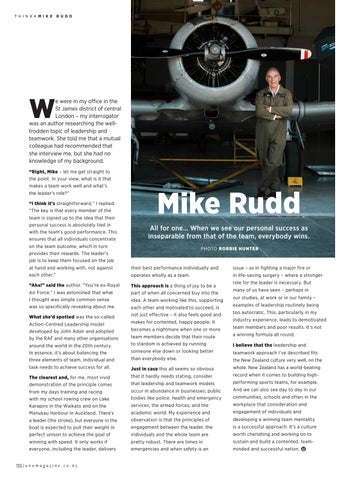T H I N K > M I K E
R U D D
W
e were in my office in the St James district of central London – my interrogator was an author researching the welltrodden topic of leadership and teamwork. She told me that a mutual colleague had recommended that she interview me, but she had no knowledge of my background. “ Right, Mike – let me get straight to the point. In your view, what is it that makes a team work well and what’s the leader’s role?” “I think it’s straightforward,” I replied. “The key is that every member of the team is signed up to the idea that their personal success is absolutely tied in with the team’s good performance. This ensures that all individuals concentrate on the team outcome, which in turn provides their rewards. The leader’s job is to keep them focused on the job at hand and working with, not against each other.”
Mike Rudd All for one… When we see our personal success as inseparable from that of the team, everybody wins. PH OTO RO B B I E H U NTE R
their best performance individually and
issue – as in fighting a major fire or
operates wholly as a team.
in life-saving surgery – where a stronger
“Aha!” said the author. “You’re ex-Royal Air Force.” I was astonished that what I thought was simple common sense was so specifically revealing about me.
This approach is a thing of joy to be a
What she’d spotted was the so-called Action-Centred Leadership model developed by John Adair and adopted by the RAF and many other organisations around the world in the 20th century. In essence, it’s about balancing the three elements of team, individual and task needs to achieve success for all.
not just effective – it also feels good and
The clearest and, for me, most vivid demonstration of the principle comes from my days training and racing with my school rowing crew on Lake Karapiro in the Waikato and on the Manukau Harbour in Auckland. There’s a leader (the stroke), but everyone in the boat is expected to pull their weight in perfect unison to achieve the goal of winning with speed. It only works if everyone, including the leader, delivers
130 | u n o m a g a z i n e . c o . n z
part of when all concerned buy into the idea. A team working like this, supporting each other and motivated to succeed, is makes for contented, happy people. It becomes a nightmare when one or more
role for the leader is necessary. But many of us have seen – perhaps in our studies, at work or in our family – examples of leadership routinely being too autocratic. This, particularly in my industry experience, leads to demotivated team members and poor results. It’s not
team members decide that their route
a winning formula all round.
to stardom is achieved by running
I believe that the leadership and
someone else down or looking better
teamwork approach I’ve described fits
than everybody else.
the New Zealand culture very well, on the
Just in case this all seems so obvious
whole. New Zealand has a world-beating
that it hardly needs stating, consider
record when it comes to building high-
that leadership and teamwork models
performing sports teams, for example.
occur in abundance in businesses; public
And we can also see day to day in our
bodies like police, health and emergency
communities, schools and often in the
services; the armed forces; and the
workplace that consideration and
academic world. My experience and
engagement of individuals and
observation is that the principles of
developing a winning team mentality
engagement between the leader, the
is a successful approach. It’s a culture
individuals and the whole team are
worth cherishing and working on to
pretty robust. There are times in
sustain and build a contented, team-
emergencies and when safety is an
minded and successful nation.























